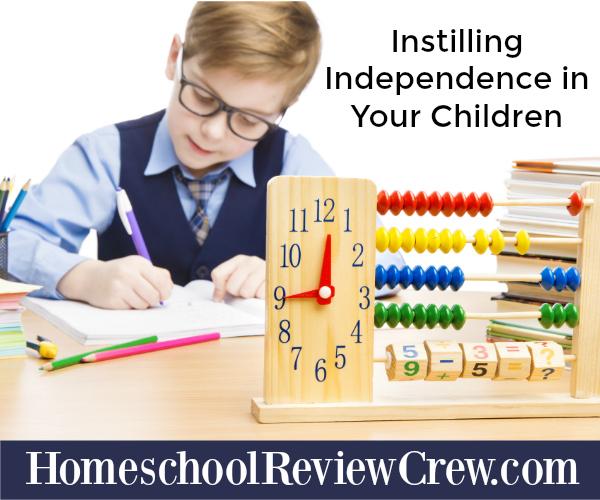Homeschooling Without Hovering
As homeschool parents, we carry our children’s education primarily, or in many cases entirely, in our own hands. That’s a school bus full of responsibility that most of us take very seriously. (Let’s not talk about the days when we toss it all and make chocolate chip cookies and call it dinner, math, and home ec.)
Despite the numerous blessings of homeschooling, there is a potential downside—we well-meaning parents can be over-involved in our children’s education and handicap our future young adults.
What?! What could possibly be wrong with being involved in every aspect of our child’s education?
At the risk of getting kicked out of the cookie line at the next homeschool convention, I want to point out two big problems with parental over-involvement.
1.) The child loses respect for the parent as a person as parental needs are repeatedly placed second to the demands of the child’s needs and education, to an extreme; this pattern is then repeated toward others throughout the child’s life. (The me-first mentality.)
2.) The child’s potential to be resourceful, to persevere, and to become a responsible, self-motivated, independent adult is, at best, hindered, if not handicapped.
Let’s summarize it with this quote from John Rosemond, author of Fail-Safe Formula For Helping Your Child Succeed in School:
“If the Little Train That Could had had a Mother Train who, upon seeing her child struggle up the mountain, got behind and pushed, there would have been no point to the story.”
How do we let our little engines climb the mountain independently? How do we avoid the trap of over-involvement in our own homeschool running under our own roof and in our own van?

First, begin with the end in sight.
Whomever you are dealing with right now in your parenting—a two-year-old, a twelve-year-old, a high school sophomore, all of the above and more—consider what you want the “end product” to be. Do you want to be writing college scholarship applications for your high school junior? Do you want to be bribing or nagging your sixth grader to do his math and answering questions on every other problem? Do you want to explain directions over and over and over again to your first grader?
Of course not! Keep the final picture in mind—you want to raise men and women, not overgrown boys and girls. Remember that.
Second, set boundaries.
If your child depends on you beyond what is necessary for his age or potential, you are training your child to give up. A child who is overly-dependent on you has little motivation to push through difficulties on his own, and you, loving parent, are enabling that lack of personal initiative. Stop immediately. Set a boundary.
Here’s an example from my homeschool (technically roadschool, since we travel full-time). One of my children “struggled” with math. She would come to a problem she didn’t understand the first time around and she’d stop. She wouldn’t struggle over it, review the lesson, or move on and come back to it later. If there was nobody to ask, she would give up. If I was available, she would ask question after question. Being the “good mom” that I am, I would walk her through every single question until my brain melted and I wanted nothing more that to hide in the van and eat chocolate chip cookies out of the bag. I mean, let’s be fair—I put in my math years, and all I want to do with math now is multiply fractions when tripling cookie recipes.
Finally, I set boundaries. After I was sure she understood the lesson, I told her that she had to do the entire assignment without asking anybody a single question. When she was finished and I had corrected the problems, she could ask for clarification on anything she got wrong. After the first week of still asking for help and being reminded that I would look at her work only when she was finished, she began doing her own work successfully without asking a single question.
The boundaries must be set according to the situation. For dawdlers, perhaps the boundary is time—missing out on a family event, like movie night, because schoolwork wasn’t done rather than Mom missing out on her bill-paying or dinner prep time because she’s hovering over a student nagging him to get his work done. For others, perhaps allowing the student to ask a certain number of questions until, say 7 p.m., is appropriate, after which, Mom is no longer Teacher. Make it work for your situation to nip your child’s dependency in the bud.
Just be sure the boundaries are clear and that you stand firm.

Third, don’t do for your children what they can do for themselves.
From little on, let your children struggle toward personal achievement. They need what Rosemond terms self-competence, as well as willingness to work through frustration in order to be successful as adults.
If your little one wants a ball that is slightly out of his reach, let him grab and pull and stretch. He may not reach the ball today, and possibly not tomorrow, but eventually he will get it on his own and will have gained more than the ball. If your high school junior wants that car, cheer him on as he hunts for a job, saves up the money, budgets for insurance, and then opts for a less expensive model as he has learned what too many adults never do—the value of a dollar and hard work. Don’t nag, don’t cajole, don’t lend money.
Offer support. Share your knowledge. Give guidance. But don’t steal their chances of future success and competence by taking their struggles on yourself. Be a coach and cheerleader, not an enabler or a doer.
Fourth, teach them to respect your time.
In a child-centric era, this is unpopular, but imagine the world when a generation of children who each believe they are the most important person in the room grows up into a generation of adults who each think they are the most important person in the room. That’s going to be ugly. It’s already ugly being in a room with one preschooler who thinks he’s the center of everyone’s world.
Teach your future adults through your boundaries and examples to respect your time—there is teaching time, there is helping time, there is parental working time. The words, “Please don’t interrupt right now,” “Mommy is working and will help you in 20 minutes,” “I can help you for five minutes,” and “No” are not and should not be taboo. There is a balance that each family has to find—the current trend is for that to swing so far in the direction of the child, that the parent has become the slave (rather than the loving servant-leader) of the slave-drivers (rather than fellow loving servants).
Teaching your children that they are important, but no more important than every other person God created, is going to do them more good than the western world admits. It will teach them to value others, including you and your time.
Let’s summarize.
Begin these steps wherever you are in homeschooling your child. Teach with the goal of independence.
Little ones should understand that you will give instructions one time, and that they are expected to listen and follow through. Middle schoolers should know their daily duties and perform them without goading or hand-holding—for most students, that should include reading instructions and checking work. By the time your students are in high school, you should barely be involved in their daily studies, if at all. Personally, my high schoolers join us for some subjects, such as a family read-aloud and some of the extras of a Charlotte Mason lifestyle (poetry, artist study, classical music) for the sheer pleasure of learning together, but the majority of their studies are done on their own.
It may feel like the opposite of love, but stepping back allows our children to step forward and reach their full potential. Plus their future spouses, future employers, and future selves will thank you abundantly.
Christy Bagasao
(TheSimpleHomemaker.com)



Wonderful post! You mentioned your Charlotte Mason lifestyle—does that mean you are an AmblesideOnline-er? I’m starting year 0 with my 5 year old after winging it last year. That being said, I was raised and schooled by my mother who was a CM follower, and even just winging it; following her examples from my school days, I am very happy with what we achieved! But I’m excited to have some more direction and hear from other Ambleside Online experiences.
Would love to hear!
Also! We are moving into a school bus this year. I haven’t roved your blog yet, but I’m excited to hear you are on the road full-time, homeschooling and following Jesus! So neat to stumble across more likeminded mothers!